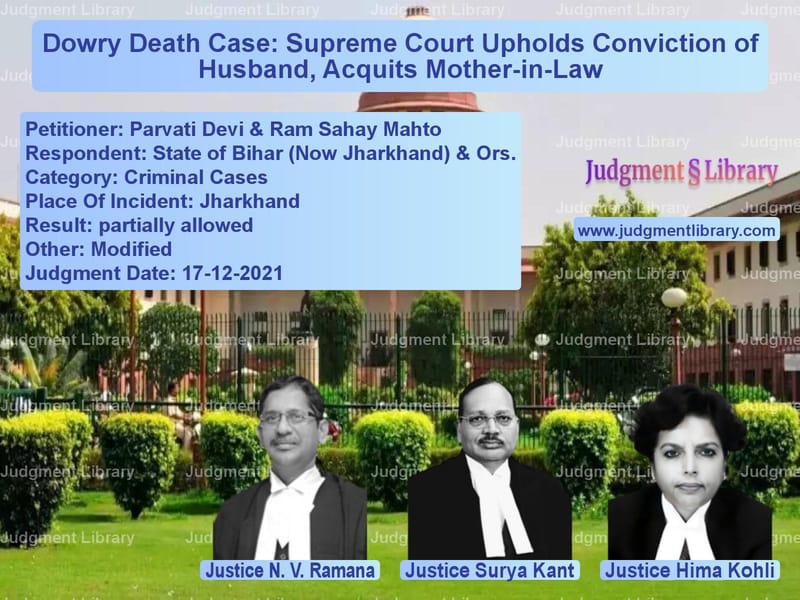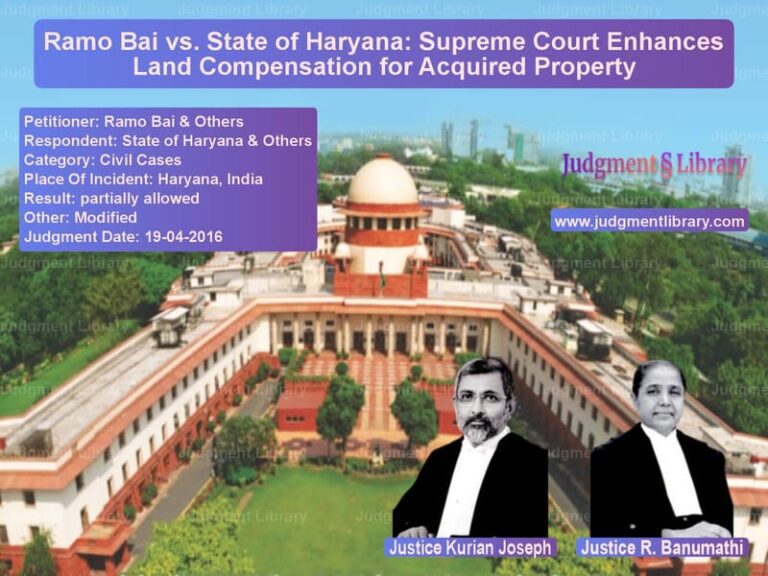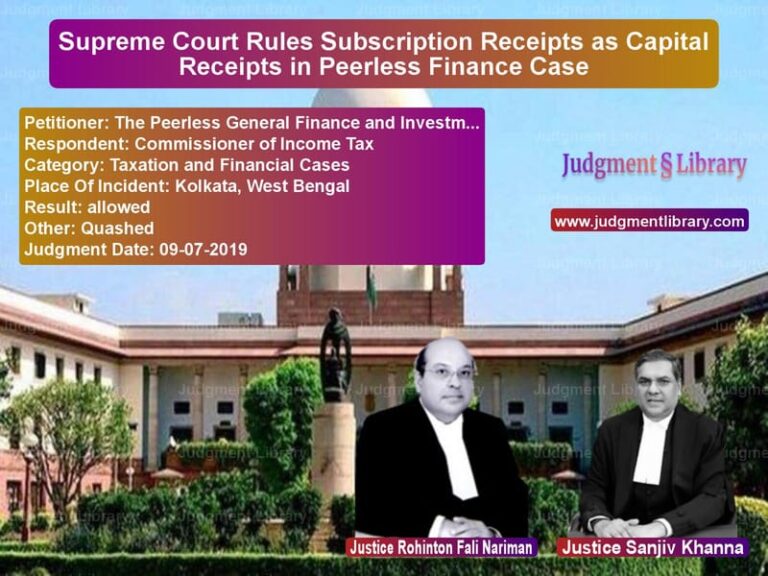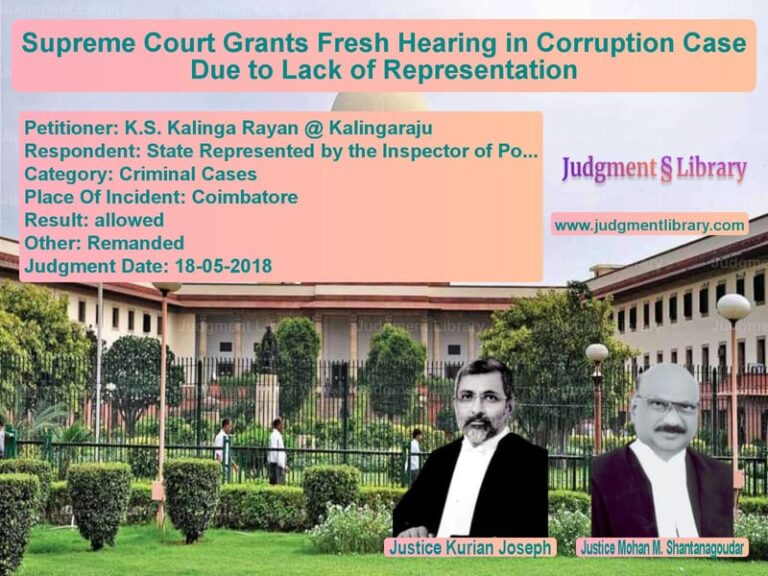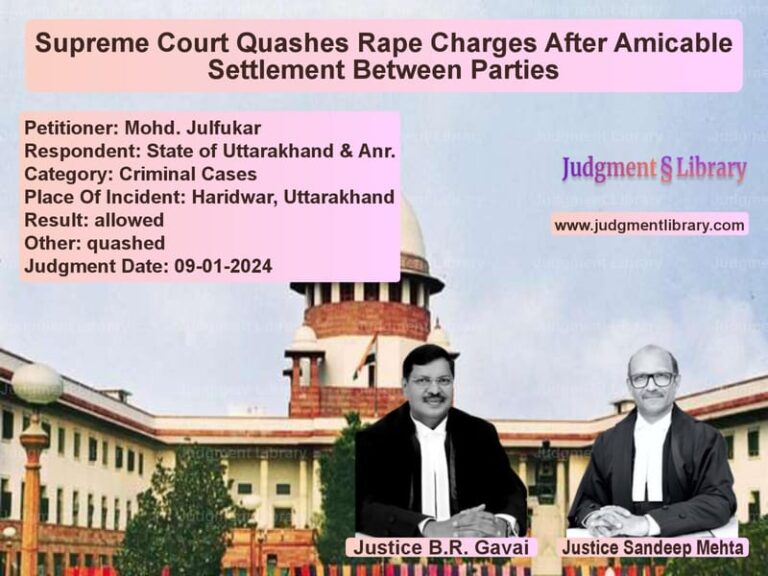Dowry Death Case: Supreme Court Upholds Conviction of Husband, Acquits Mother-in-Law
In a recent judgment, the Supreme Court of India upheld the conviction of a husband in a dowry death case under Section 304B of the Indian Penal Code (IPC) while acquitting the mother-in-law due to lack of sufficient evidence. The case revolved around the tragic death of Fulwa Devi, who allegedly faced persistent dowry demands from her husband, Ram Sahay Mahto, and his family before her mysterious disappearance and subsequent death.
Background of the Case
The case was initiated following the disappearance of Fulwa Devi, who had been married to Ram Sahay Mahto in 1997. According to the prosecution, within months of the marriage, the husband (A-1), his father Nema Mahto (since deceased), and his mother Parvati Devi (A-3) began harassing her for dowry, demanding Rs.20,000 and a Rajdoot motorcycle. When these demands were not met, Fulwa Devi was subjected to severe ill-treatment.
On August 8, 1997, a missing persons report was filed at Birni Police Station by her father, Bodhi Mahto (PW-3). Five days later, a skeleton was discovered on the banks of the Barakar River, which was later identified as that of Fulwa Devi. The local police registered a case against the accused under Sections 304B and 201 of the IPC and Sections 3 and 4 of the Dowry Prohibition Act.
Arguments Presented by the Prosecution
The prosecution, represented by the State of Jharkhand, argued the following:
- Fulwa Devi was subjected to continuous harassment over dowry demands.
- Witnesses, including family members, confirmed that she had repeatedly informed them about the threats she received from her husband and in-laws.
- The accused had warned Fulwa Devi that if the dowry was not given, A-1 would remarry.
- The discovery of her body, in a decomposed state, pointed to a case of homicide.
- The accused failed to report her disappearance or make any efforts to search for her, further strengthening the suspicion against them.
Arguments Presented by the Defense
The defense counsel contended the following points:
- There was no direct evidence linking the accused to the death of Fulwa Devi.
- The body found was decomposed and unidentifiable, making it uncertain whether it belonged to the deceased.
- Ram Sahay Mahto (A-1) claimed that he was not present at the time of the incident and was working in Kolkata.
- Parvati Devi (A-3) argued that she had no active involvement in any dowry-related harassment.
Supreme Court’s Observations and Judgment
After reviewing the evidence, the Supreme Court upheld the conviction of Ram Sahay Mahto but acquitted Parvati Devi. The Court observed the following:
- Fulwa Devi’s death occurred under unnatural circumstances within seven years of marriage.
- There was sufficient evidence to prove that soon before her death, she was subjected to cruelty over dowry demands.
- The husband, being the primary person responsible for her well-being, failed to explain her disappearance, leading to a presumption under Section 113B of the Evidence Act.
- The mother-in-law’s involvement in dowry harassment was based on general allegations without concrete proof, making her conviction unsustainable.
The Court stated:
“There is sufficient evidence brought on record to inculpate Ram Sahay Mahto, A-1. The circumstances unerringly point to his guilt in extinguishing the life of his wife within a few months of the marriage on her failing to satisfy the demands of dowry.”
However, regarding the mother-in-law, the Court ruled:
“From the evidence on record, only certain omnibus allegations have been made against Parvati Devi (A-3) with respect to dowry demands. No specific evidence or testimony has been provided against her. Hence, her conviction cannot be sustained.”
Key Legal Precedents Considered
- National Insurance Co. Ltd. v. Pranay Sethi – Defined the elements required to establish a case under Section 304B IPC.
- Maya Devi v. State of Haryana – Stressed the necessity of proving harassment soon before death.
- Bansi Lal v. State of Haryana – Explained that cruelty for dowry must be continuous and near the time of death.
- G.V. Siddaramesh v. State of Karnataka – Highlighted the importance of circumstantial evidence in dowry death cases.
Final Verdict
The Supreme Court ruled as follows:
- Ram Sahay Mahto’s (A-1) conviction under Section 304B IPC was upheld, and he was directed to surrender to serve the remainder of his sentence.
- Parvati Devi’s (A-3) conviction was set aside, and she was ordered to be released immediately if not required in any other case.
Implications of the Judgment
This judgment is significant for multiple reasons:
- It upholds the strict liability of husbands in dowry-related deaths.
- It emphasizes that general allegations against in-laws, without supporting evidence, cannot be a basis for conviction.
- It reinforces the importance of circumstantial evidence in cases where direct evidence is unavailable.
- It highlights the role of Section 113B of the Evidence Act in presuming dowry deaths when harassment is proven.
This ruling ensures that while the guilty are punished, innocent family members are not wrongly convicted based on vague allegations. It sets a precedent for future dowry death cases, ensuring justice is based on solid evidence rather than presumptions.
Read also: https://judgmentlibrary.com/death-penalty-commuted-to-life-imprisonment-in-child-murder-case/
Petitioner Name: Parvati Devi & Ram Sahay Mahto.Respondent Name: State of Bihar (Now Jharkhand) & Ors..Judgment By: Justice N. V. Ramana, Justice Surya Kant, Justice Hima Kohli.Place Of Incident: Jharkhand.Judgment Date: 17-12-2021.
Don’t miss out on the full details! Download the complete judgment in PDF format below and gain valuable insights instantly!
Download Judgment: parvati-devi-&-ram-s-vs-state-of-bihar-(now-supreme-court-of-india-judgment-dated-17-12-2021.pdf
Directly Download Judgment: Directly download this Judgment
See all petitions in Dowry Cases
See all petitions in Alimony and Maintenance
See all petitions in Judgment by N.V. Ramana
See all petitions in Judgment by Surya Kant
See all petitions in Judgment by Hima Kohli
See all petitions in partially allowed
See all petitions in Modified
See all petitions in supreme court of India judgments December 2021
See all petitions in 2021 judgments
See all posts in Criminal Cases Category
See all allowed petitions in Criminal Cases Category
See all Dismissed petitions in Criminal Cases Category
See all partially allowed petitions in Criminal Cases Category

